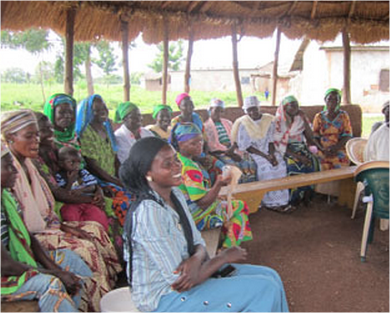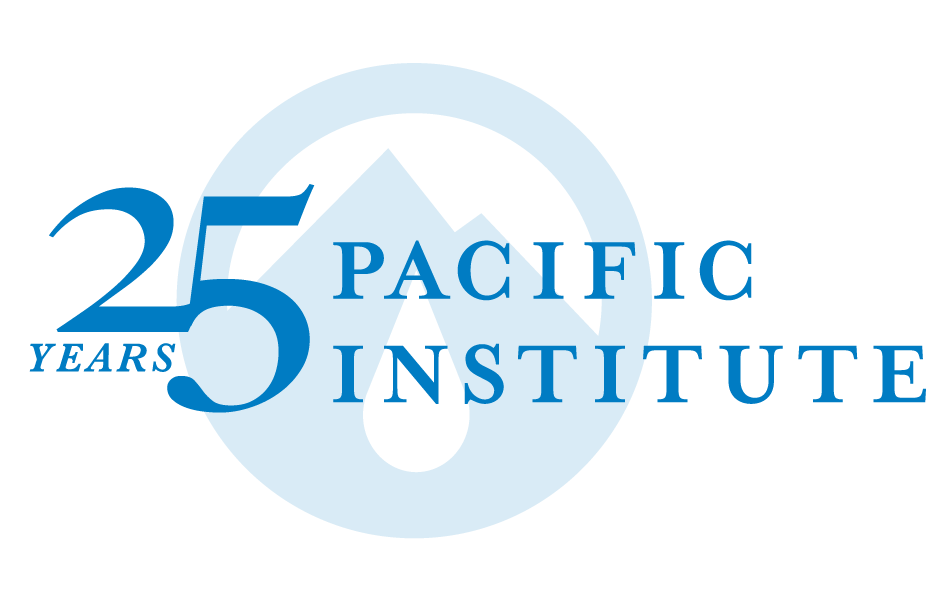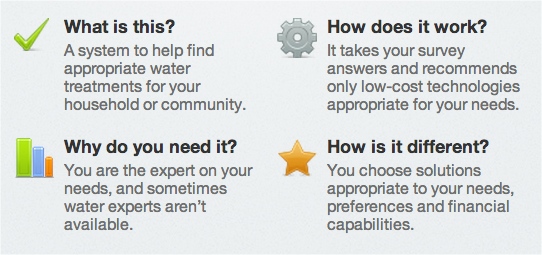Difference between revisions of "Pacific Institute Community Choices"
(→Acknowledgements) |
|||
| Line 1: | Line 1: | ||
[[Image:Pac Institute logo.png|right|130px|link=http://pacinst.org/]] | [[Image:Pac Institute logo.png|right|130px|link=http://pacinst.org/]] | ||
| − | [[Image:commChoices2.png|thumb|right|200px|Photo: [http:// | + | [[Image:commChoices2.png|thumb|right|200px|Photo: [http://pacinst.org/ Pacific Institute]]] |
<font size="3" color="#696969">This new system provides free information about proven, low-cost technologies for household water treatment, including information on local resources within your area, region or country.</font> | <font size="3" color="#696969">This new system provides free information about proven, low-cost technologies for household water treatment, including information on local resources within your area, region or country.</font> | ||
Latest revision as of 00:51, 16 May 2015

This new system provides free information about proven, low-cost technologies for household water treatment, including information on local resources within your area, region or country.
Community Choices lets you do two things:
- Get help choosing a solution: You can use the decision-making support system, which provides a short survey asking a few simple questions about you and your water needs (or those who need a solution), then lists only the most appropriate options for your situation. If you like, you can save your survey results and login later to see them again.
- Enter library to read about all the water treatments: You can directly access the library of technologies for treating water. These are the same descriptions you would see after completing the survey, however you will not receive recommendations on which technologies are appropriate for you.
| To the Community Choices Tool |
History
Community Choices emerged from Pacific Institute’s commitment to addressing the lack of safe drinking water and sanitation in developing countries, by actively engaging affected communities and residents.
Over the years, we have regularly fielded questions from field practitioners and communities in the developing world such as:
- How can safe drinking water be provided?
- How can safe sanitation be provided?
- Can you recommend the best, lowest-cost option for my community which is extremely (wet/dry/mountainous/on the coast)?
- What kind of water purification can I use with (firewood/solar energy/local materials)?
- Community Choices was designed to capture some of the expert knowledge held by water, sanitation, and hygiene experts, and make it available to a wider audience in an easy-to-use format. It belongs to a broad class of software sometimes called expert systems, or decision-making support systems.
The Community Choices System is under active development by researchers at the Pacific Institute, in Oakland, California. We thank the Conrad N. Hilton Foundation for generously providing the funds to create this prototype.
Frequently Asked Questions (FAQ)
- What is Community Choices How does it work?
The Community Choices prototype is an online water, sanitation, and hygiene (WASH) sector decision-making support system that makes available trapped knowledge, helping communities, governments, donors, and service providers identify technical and financial options for meeting their water supply needs.
- What is the goal of the Community Choices phase that you’re currently in?
The goal of the two-year Implementation Phase of the Community Choices Project is to collaboratively design and develop a WASH sector decision support system that provides West African WASH practitioners, community members, NGOs, donor organizations, and local governments with accessible, dynamic, and comprehensive information on appropriate and available technologies and solutions to WASH sector problems.
- Who is the intended WASH Choices audience?
NGOs, community based organizations, local governments and those who serve communities are the intended audiences.
- How do you intend to pilot Community Choices?
We will pilot WASH Choices by developing a testable alpha version, and working with key partners in West Africa to assist a community in making decisions about appropriate water or sanitation facilities and financing options.
- Is Community Choices an open source project?
Yes, we intend for Community Choices to be an open source project. Currently, it’s in a prototype pilot phase.
- Who are your partners for the pilot?
We are working with several NGOs in West Africa, including CREPA (Burkina Faso), ProNet North (Ghana), World Vision, NewEnergy (Northern Region) (Ghana).


